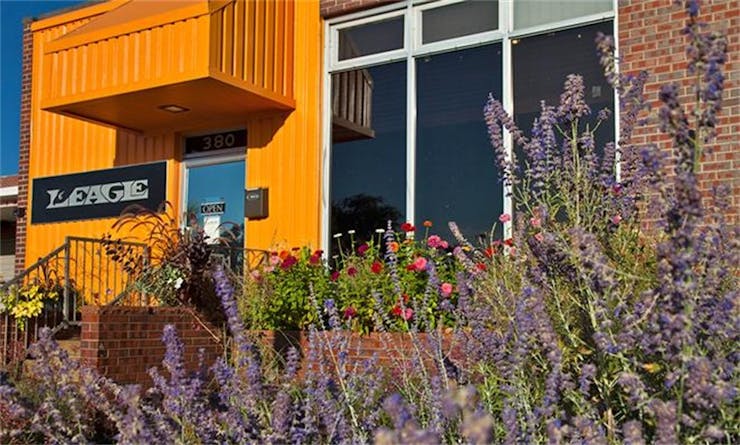It’s one thing to value sustainable, environmentally-conscious business practices, and it’s another to place them at the forefront of your everyday routine. You’d be hard-pressed to find a cannabis business that cares about this more than L’Eagle, a cultivator and retailer based out of Denver, Colorado.
Amy and John Andrle first opened L’Eagle’s doors to the medical community in 2010, and by 2013, they expanded to serve the 21+ adult-use market as a producer and retailer. For the past two years, L’Eagle has been recognized as Certifiably Green by the Denver Department of Public Health and Environment, an achievement granted to businesses demonstrating conservation and reduction in energy, water, waste, and more. It has been the first and only cannabis business in Colorado to achieve Certifiably Green to date. L’Eagle was also recently granted the NCIA’s Excellence in Innovation Award for its cultivation practices.
But what does it mean to be a “sustainable and organic” business in the cannabis industry?
Amy Andrle, co-owner of L’Eagle, sat down with Leafly to discuss how they applied philosophy to business, creating a model that is conscious of the consumer’s health as well as the environment’s.
Tips for Creating a Sustainable Retail Cannabis Business
1. Self-Sustaining Growing and Retail Models
L’Eagle’s retail business sells its own in-house flower, and about 80% of its other products (such as concentrates and edibles) are produced using the remaining trim. This efficient and self-sustaining production was the first step of many toward the company’s sustainability practices of today.
For L’Eagle, sustainability is practiced both in cannabis cultivation and on the retail side. Because the business shares one footprint, it’s able to double-up on practices that benefit both the grow facility and the retail store. For example, its HVAC system regulates the climate and eliminates pests and disease, all while keeping the air clean for employees and customers.
2. Landfill Diversion
L’Eagle has also incorporated landfill diversion into its production process. Landfill diversion comes into play on both the producer and consumer side. As producers, L’Eagle identifies what can be made compostable or recyclable to reduce waste in the landfill. By working with the local waste management company Alpine, L’Eagle has been able to take a large portion of its production byproducts straight to composting systems. On the consumer side L’Eagle offers discounts to customers who return its packaging to be recycled.
3. Clean Cannabis Standards
Producing clean cannabis is L’Eagles primary goal. With John’s background in the food and beverage industry, L’Eagle naturally fixed its gaze upon clean craft cannabis. “We had a philosophy of wanting to cultivate and treat cannabis the way you would treat food,” Amy said.
Shop highly rated dispensaries near you
Showing you dispensaries nearIt became evident early on that this philosophy would be what provided L’Eagle its edge in a competitive market. By its definition, “clean cannabis” means the product meets the standards of USDA organic certified products. (Because cannabis is federally prohibited, it cannot qualify for USDA organic certification.) Harmful pesticides and chemical nutrients can take time to break down, causing damage to the environment and consumer. As of January 2018, L’Eagle is Clean Green Certified, the number one certifier for clean cannabis.
As for next steps, L’Eagle recently switched to an all LED nursery and is exploring solar power for its retail and administrative facilities.
4. Education in Eco-Friendly Cannabis Practice
Education has played a major role in L’Eagle’s sustainable practices. Whether it’s informing consumers or fellow cultivators and retailers, the company has led efforts in sharing information that’s not readily available.
Again, L’Eagle cannot apply to be recognized as USDA Organic, which creates a lot of confusion for consumers as it tries to decipher what companies are adopting organic practices, regardless of claims and other certifications. As a result, L’Eagle has taken it upon itself to educate its customers about its own standards, empowering the company to discuss clean, sustainable cannabis with its dispensary customers.
L’Eagle has also worked with the Denver Department of Public Health and Environment to create the cannabis sustainability workgroup. This group provides educational materials to businesses in the industry that are looking to adopt sustainable practices. Additionally, Amy also sits on the board of the Cannabis Certification Council (CCC), which serves to educate and certify businesses that practice clean cannabis standards. Through the CCC, they organize the annual Cannabis Sustainability Symposium which brings the industry together to explore more environmentally-conscious practices and technologies.
Can Clean, Sustainable Cannabis Business Stay Competitive?
While finding a competitive position as a mom-and-pop business can be difficult, L’Eagle has carved out a special niche as an ambassador for clean cannabis. Initially, it would wholesale a large percentage of its inventory, but this didn’t make up for the high costs of producing clean, organic craft cannabis.
Fortunately, the market is evolving and consumers are taking interest in clean cannabis. This shift combined with L’Eagle’s ability to sell its product in its own retail location kept the business alive and competitive.
While consumers dictate the market, Amy believes this trend has been slow to take hold in cannabis. “Consumers walk into dispensaries, and they feel like it’s a privilege to be there,” she said. “They don’t realize that their dollars drive that store.”
Amy is confident that there’s a place for clean, craft cannabis in this industry as consumers become more educated and passionate about what defines it. For L’Eagle the future is clear: keep producing these clean products and empower consumers to demand practices that are better for them and the environment we share.





